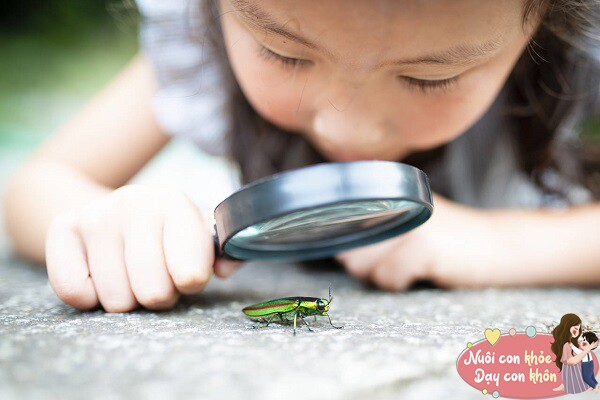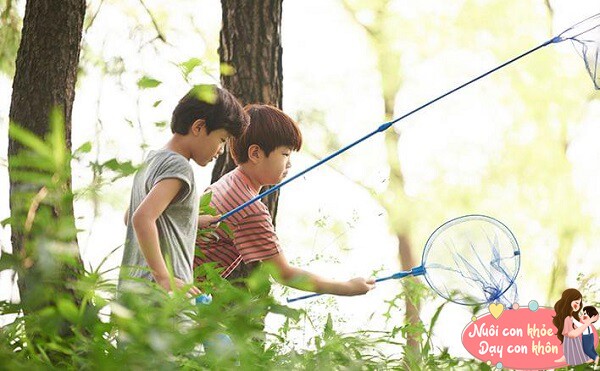Scientists have discovered that when people see something that piques their curiosity, their pupils dilate by around 30%, and conversely, they constrict when bored.
A study published in the journal Cognition also found that individuals with larger pupils tend to have higher IQs, encompassing logic, attention, and memory.
The pupil is a small, black, circular hole in the center of the eye, through which light enters. When intrigued by something, we can’t help but carefully look at it. Our eyes tend to open wide during this process. As light reflection increases, the black part of the eye (pupil) and the white part (sclera and conjunctiva) become more distinct, making the eyes appear brighter.
One common trait among children with high IQs is their insatiable curiosity. They are interested in a multitude of things and have a desire to discover the laws of nature, goals to strive for, and a willingness to embrace various challenges. As a result, their eyes sparkle with enthusiasm.

In other words, a child’s intelligence can be discerned through their eyes.
If you observe carefully, you’ll notice that infants and young children have eyes that appear darker and brighter, exuding an aura of purity and intelligence. However, as time passes, this sparkle tends to fade.
This phenomenon occurs because, when children are born, everything is new and intriguing, and they can’t help but scan their surroundings. Their eyes shine brightly as they take in the world around them.
After a child is born, the brain starts forming neural pathways, much like roads leading to different places, enabling the flow of information between various brain regions and the body. When a child is curious about something, they will try to touch and explore it.
For instance, if a child sees a red ocean ball, they will crawl towards it, touch it, and maybe even put it in their mouth to “taste” it. This sensory stimulation creates a neural pathway in the brain.
Frequently used pathways are strengthened, while those that are unused are pruned away.
Although IQ is influenced by genetics, the brain is highly malleable. With the right nurturing, IQ can be improved in various ways.
Curiosity is the best fuel for brain development. When children engage in activities they enjoy and pursue their passions, they can enhance their focus, creativity, and problem-solving abilities, thereby improving their intelligence.

Pay Attention to Your Child’s Questions
Around the age of three, children experience a curiosity boom, becoming fascinated by their surroundings and asking all sorts of peculiar questions.
These “what is this?” and “why?” questions are seeds of wisdom. Parents should take these inquiries seriously and provide thoughtful answers to nurture their child’s intellectual growth.
Instead of giving immediate answers, take the time to explore and discover together. For example, you could research the topic online or at the library, encouraging deeper understanding and stimulating their curiosity further.
Most importantly, during this process, parents should lead by example. If you come across something you don’t understand, take the initiative to learn and find solutions. Gradually, your child’s problem-solving skills will strengthen.


Encourage Outdoor Play
Children who spend time outdoors, especially in natural settings, tend to have brighter eyes and make more minor discoveries. Immersing themselves in nature allows them to appreciate the beauty of their surroundings and fosters their exploration and creativity.
Nature offers a wealth of fascinating elements, and when children want to bring their imagination to life, they often succeed. For instance, if a child wants to build a house from branches and weeds, they can do so as long as they visualize and plan in their mind.
These activities enhance motor skills, encourage creativity, and allow children to express their ideas freely without the constraints of rules or predetermined frameworks.
During these moments, parents should take a step back and quietly observe their child’s play and discoveries, ensuring their safety.
Instead of intervening immediately, ask questions that spark curiosity, such as, “What are you building?” or “Why did you choose those branches?” This approach encourages conversation and deeper thought about their actions.

Provide Access to Books
Children’s interests are often discovered through play. Once you know what your child enjoys, provide them with relevant picture books or encyclopedias and place them within their reach, such as on the sofa in the living room or the bedside table. This creates a book-rich environment that encourages exploration in their areas of interest and fosters a love of reading from an early age.
Initially, your child may not show much interest in these books, but that’s okay. Give them time to discover and become familiar with the content. Every child has their own pace for absorbing information and developing hobbies, and passions can sometimes emerge from unexpected places.
Once they discover the joy of reading, they will likely beg you to read to them. Through the pages of a book, they can explore new worlds, meet fascinating characters, and learn valuable life lessons.


Offer Research Materials
There are two types of curiosity. The first is a broad exploration of unknown information without specific goals, characterized by statements like, “I like trying new things,” “I come up with new ideas,” and “I’m interested in everything.” Children in this state will play with anything new they encounter.
The second type is more focused, involving specific goals and in-depth information gathering about those goals. For example, a child might be particularly interested in insects and feel that a superficial understanding is insufficient, prompting them to delve deeper into the world of entomology.
When a child is curious about something and determined to research it, remember to provide them with the necessary resources.
For instance, if your child is fascinated by plants, offer them relevant books and videos.

Remember, don’t overwhelm them with too much information at once. Offer resources gradually, as children have limited attention spans and can only absorb so much at a time. Overloading them with information may dampen their curiosity.
Every child who loves to explore the world has a galaxy in their eyes, much like a tree in spring, always reaching for the light.
Since curiosity can make a child’s eyes shine brighter, let’s nurture their innate curiosity and love for learning from their very first steps.







































